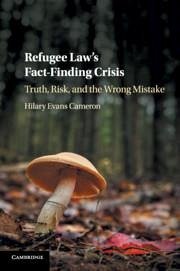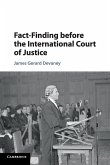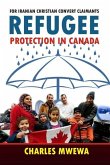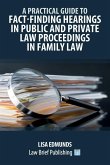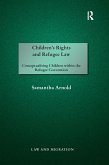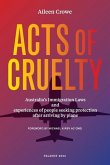Hilary Evans Cameron
Refugee Law's Fact-Finding Crisis
Hilary Evans Cameron
Refugee Law's Fact-Finding Crisis
- Broschiertes Buch
- Merkliste
- Auf die Merkliste
- Bewerten Bewerten
- Teilen
- Produkt teilen
- Produkterinnerung
- Produkterinnerung
With refugee crises featuring in the news daily, the failures of refugee law and refugee protection are increasingly apparent. This book suggests a way forward. For scholars and students of refugee law, refugee studies, forced migration, and administrative law, along with lawyers and policy actors.
Andere Kunden interessierten sich auch für
![Fact-Finding before the International Court of Justice Fact-Finding before the International Court of Justice]() James Gerard DevaneyFact-Finding before the International Court of Justice40,99 €
James Gerard DevaneyFact-Finding before the International Court of Justice40,99 €![Refugee Protection in Canada: For Iranian Christian Convert Claimants Refugee Protection in Canada: For Iranian Christian Convert Claimants]() Charles MwewaRefugee Protection in Canada: For Iranian Christian Convert Claimants53,99 €
Charles MwewaRefugee Protection in Canada: For Iranian Christian Convert Claimants53,99 €![A Practical Guide to Fact-Finding Hearings in Public and Private Law Proceedings in Family Law A Practical Guide to Fact-Finding Hearings in Public and Private Law Proceedings in Family Law]() Lisa EdmundsA Practical Guide to Fact-Finding Hearings in Public and Private Law Proceedings in Family Law98,99 €
Lisa EdmundsA Practical Guide to Fact-Finding Hearings in Public and Private Law Proceedings in Family Law98,99 €![Children's Rights and Refugee Law Children's Rights and Refugee Law]() Samantha ArnoldChildren's Rights and Refugee Law68,99 €
Samantha ArnoldChildren's Rights and Refugee Law68,99 €![Acts of Cruelty Acts of Cruelty]() Aileen CroweActs of Cruelty20,99 €
Aileen CroweActs of Cruelty20,99 €![Banned Banned]() Shoba Sivaprasad WadhiaBanned30,99 €
Shoba Sivaprasad WadhiaBanned30,99 €![Borderlines: The Edges of Us Capitalism, Immigration, and Democracy Borderlines: The Edges of Us Capitalism, Immigration, and Democracy]() Daniel MeloBorderlines: The Edges of Us Capitalism, Immigration, and Democracy13,99 €
Daniel MeloBorderlines: The Edges of Us Capitalism, Immigration, and Democracy13,99 €-
-
-
With refugee crises featuring in the news daily, the failures of refugee law and refugee protection are increasingly apparent. This book suggests a way forward. For scholars and students of refugee law, refugee studies, forced migration, and administrative law, along with lawyers and policy actors.
Hinweis: Dieser Artikel kann nur an eine deutsche Lieferadresse ausgeliefert werden.
Hinweis: Dieser Artikel kann nur an eine deutsche Lieferadresse ausgeliefert werden.
Produktdetails
- Produktdetails
- Verlag: Cambridge University Press
- Seitenzahl: 231
- Erscheinungstermin: 8. August 2019
- Englisch
- Abmessung: 228mm x 149mm x 17mm
- Gewicht: 320g
- ISBN-13: 9781108448086
- ISBN-10: 1108448089
- Artikelnr.: 57383494
- Herstellerkennzeichnung
- Libri GmbH
- Europaallee 1
- 36244 Bad Hersfeld
- gpsr@libri.de
- Verlag: Cambridge University Press
- Seitenzahl: 231
- Erscheinungstermin: 8. August 2019
- Englisch
- Abmessung: 228mm x 149mm x 17mm
- Gewicht: 320g
- ISBN-13: 9781108448086
- ISBN-10: 1108448089
- Artikelnr.: 57383494
- Herstellerkennzeichnung
- Libri GmbH
- Europaallee 1
- 36244 Bad Hersfeld
- gpsr@libri.de
A former litigator, Hilary Evans Cameron represented refugee claimants for a decade. She holds a doctorate in refugee law from the University of Toronto and is the author of numerous publications including a book about the law of fact-finding in refugee status decision-making (Refugee Law's Fact-finding Crisis: Truth, Risk, and the Wrong Mistake, Cambridge 2018). Her research, which largely focuses on credibility assessment in refugee status decision-making, has been influential internationally and was included in a leading anthology of 'the finest scholarship available' in refugee law from the 1930s to the present (Hathaway 2014). Dr. Evans Cameron was the Canadian Social Sciences and Humanities Research Council's 2017 Bora Laskin National Fellow in Human Rights Research. She is an Assistant Professor at Ryerson University's Faculty of Law.
Introduction
Part I: 1. The wrong mistake
1.1. The traditional economic approach
1.2. A psychologically founded theory
1.3. A comparative study
1.4. Conclusion
Part II: 2. Setting the scene
2.1. At the refugee board
2.2. At the Federal Court
2.3. The case study: method and findings
3. The wrong mistake: sending a refugee home
3.1. Wrongly disbelieving the claimant
3.2. Overlooking objective danger
3.3. Denying claims on procedural grounds
3.4. Conclusion
4. Resolving doubt in the claimant's favour
4.1. The burden of proof
4.2. Standards of proof
4.3. Presumption of truthfulness
4.4. Conclusion
5. The wrong mistake: accepting an unfounded claim
: 5.1. Refugee claimants are ordinary litigants
5.2. The member is an ordinary decision-maker
5.3. Conclusion
6. Resolving doubt at the claimant's expense
6.1. The burden of proof
6.2. Standards of proof
6.3. Presumptions
6.4. Conclusion
7. In the hearing room: 7.1. Conflicting standards of proof
7.2. Permissible inferences: rational action and memory
7.3. Conclusion
Part III: 8. A way forward
8.1. The wrong mistake in international refugee law
8.2. The Karanakaran approach
8.3. Refugee status determination as an abductive risk assessment
8.4. Conclusion.
Part I: 1. The wrong mistake
1.1. The traditional economic approach
1.2. A psychologically founded theory
1.3. A comparative study
1.4. Conclusion
Part II: 2. Setting the scene
2.1. At the refugee board
2.2. At the Federal Court
2.3. The case study: method and findings
3. The wrong mistake: sending a refugee home
3.1. Wrongly disbelieving the claimant
3.2. Overlooking objective danger
3.3. Denying claims on procedural grounds
3.4. Conclusion
4. Resolving doubt in the claimant's favour
4.1. The burden of proof
4.2. Standards of proof
4.3. Presumption of truthfulness
4.4. Conclusion
5. The wrong mistake: accepting an unfounded claim
: 5.1. Refugee claimants are ordinary litigants
5.2. The member is an ordinary decision-maker
5.3. Conclusion
6. Resolving doubt at the claimant's expense
6.1. The burden of proof
6.2. Standards of proof
6.3. Presumptions
6.4. Conclusion
7. In the hearing room: 7.1. Conflicting standards of proof
7.2. Permissible inferences: rational action and memory
7.3. Conclusion
Part III: 8. A way forward
8.1. The wrong mistake in international refugee law
8.2. The Karanakaran approach
8.3. Refugee status determination as an abductive risk assessment
8.4. Conclusion.
Introduction
Part I: 1. The wrong mistake
1.1. The traditional economic approach
1.2. A psychologically founded theory
1.3. A comparative study
1.4. Conclusion
Part II: 2. Setting the scene
2.1. At the refugee board
2.2. At the Federal Court
2.3. The case study: method and findings
3. The wrong mistake: sending a refugee home
3.1. Wrongly disbelieving the claimant
3.2. Overlooking objective danger
3.3. Denying claims on procedural grounds
3.4. Conclusion
4. Resolving doubt in the claimant's favour
4.1. The burden of proof
4.2. Standards of proof
4.3. Presumption of truthfulness
4.4. Conclusion
5. The wrong mistake: accepting an unfounded claim
: 5.1. Refugee claimants are ordinary litigants
5.2. The member is an ordinary decision-maker
5.3. Conclusion
6. Resolving doubt at the claimant's expense
6.1. The burden of proof
6.2. Standards of proof
6.3. Presumptions
6.4. Conclusion
7. In the hearing room: 7.1. Conflicting standards of proof
7.2. Permissible inferences: rational action and memory
7.3. Conclusion
Part III: 8. A way forward
8.1. The wrong mistake in international refugee law
8.2. The Karanakaran approach
8.3. Refugee status determination as an abductive risk assessment
8.4. Conclusion.
Part I: 1. The wrong mistake
1.1. The traditional economic approach
1.2. A psychologically founded theory
1.3. A comparative study
1.4. Conclusion
Part II: 2. Setting the scene
2.1. At the refugee board
2.2. At the Federal Court
2.3. The case study: method and findings
3. The wrong mistake: sending a refugee home
3.1. Wrongly disbelieving the claimant
3.2. Overlooking objective danger
3.3. Denying claims on procedural grounds
3.4. Conclusion
4. Resolving doubt in the claimant's favour
4.1. The burden of proof
4.2. Standards of proof
4.3. Presumption of truthfulness
4.4. Conclusion
5. The wrong mistake: accepting an unfounded claim
: 5.1. Refugee claimants are ordinary litigants
5.2. The member is an ordinary decision-maker
5.3. Conclusion
6. Resolving doubt at the claimant's expense
6.1. The burden of proof
6.2. Standards of proof
6.3. Presumptions
6.4. Conclusion
7. In the hearing room: 7.1. Conflicting standards of proof
7.2. Permissible inferences: rational action and memory
7.3. Conclusion
Part III: 8. A way forward
8.1. The wrong mistake in international refugee law
8.2. The Karanakaran approach
8.3. Refugee status determination as an abductive risk assessment
8.4. Conclusion.

